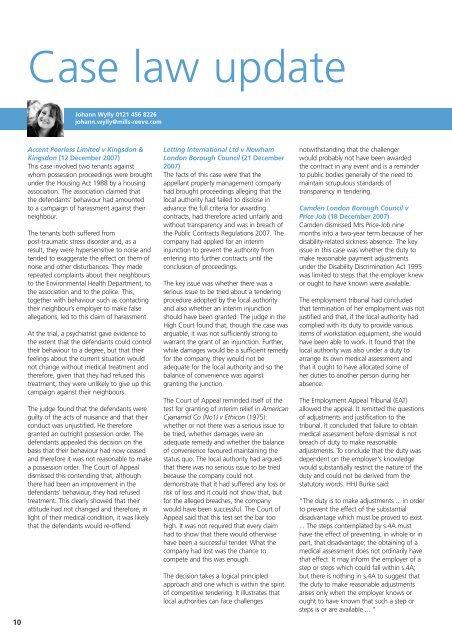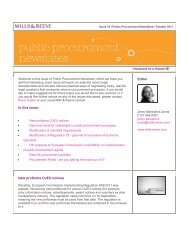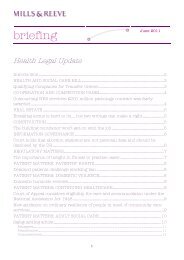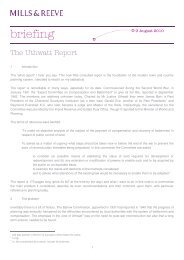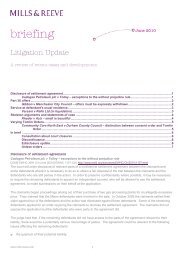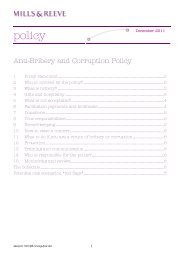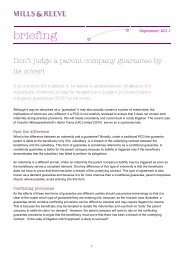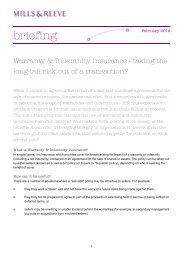Public Eye - Spring 2008 - Mills & Reeve
Public Eye - Spring 2008 - Mills & Reeve
Public Eye - Spring 2008 - Mills & Reeve
Create successful ePaper yourself
Turn your PDF publications into a flip-book with our unique Google optimized e-Paper software.
Case law update<br />
Johann Wylly 0121 456 8226<br />
johann.wylly@mills-reeve.com<br />
10<br />
Accent Peerless Limited v Kingsdon &<br />
Kingsdon (12 December 2007)<br />
This case involved two tenants against<br />
whom possession proceedings were brought<br />
under the Housing Act 1988 by a housing<br />
association. The association claimed that<br />
the defendants’ behaviour had amounted<br />
to a campaign of harassment against their<br />
neighbour.<br />
The tenants both suffered from<br />
post-traumatic stress disorder and, as a<br />
result, they were hypersensitive to noise and<br />
tended to exaggerate the effect on them of<br />
noise and other disturbances. They made<br />
repeated complaints about their neighbours<br />
to the Environmental Health Department, to<br />
the association and to the police. This,<br />
together with behaviour such as contacting<br />
their neighbour’s employer to make false<br />
allegations, led to this claim of harassment.<br />
At the trial, a psychiatrist gave evidence to<br />
the extent that the defendants could control<br />
their behaviour to a degree, but that their<br />
feelings about the current situation would<br />
not change without medical treatment and<br />
therefore, given that they had refused this<br />
treatment, they were unlikely to give up this<br />
campaign against their neighbours.<br />
The judge found that the defendants were<br />
guilty of the acts of nuisance and that their<br />
conduct was unjustified. He therefore<br />
granted an outright possession order. The<br />
defendants appealed this decision on the<br />
basis that their behaviour had now ceased<br />
and therefore it was not reasonable to make<br />
a possession order. The Court of Appeal<br />
dismissed this contending that, although<br />
there had been an improvement in the<br />
defendants’ behaviour, they had refused<br />
treatment. This clearly showed that their<br />
attitude had not changed and therefore, in<br />
light of their medical condition, it was likely<br />
that the defendants would re-offend.<br />
Letting International Ltd v Newham<br />
London Borough Council (21 December<br />
2007)<br />
The facts of this case were that the<br />
appellant property management company<br />
had brought proceedings alleging that the<br />
local authority had failed to disclose in<br />
advance the full criteria for awarding<br />
contracts, had therefore acted unfairly and<br />
without transparency and was in breach of<br />
the <strong>Public</strong> Contracts Regulations 2007. The<br />
company had applied for an interim<br />
injunction to prevent the authority from<br />
entering into further contracts until the<br />
conclusion of proceedings.<br />
The key issue was whether there was a<br />
serious issue to be tried about a tendering<br />
procedure adopted by the local authority<br />
and also whether an interim injunction<br />
should have been granted. The judge in the<br />
High Court found that, though the case was<br />
arguable, it was not sufficiently strong to<br />
warrant the grant of an injunction. Further,<br />
while damages would be a sufficient remedy<br />
for the company, they would not be<br />
adequate for the local authority and so the<br />
balance of convenience was against<br />
granting the junction.<br />
The Court of Appeal reminded itself of the<br />
test for granting of interim relief in American<br />
Cyanamid Co (No1) v Ethicon (1975):<br />
whether or not there was a serious issue to<br />
be tried, whether damages were an<br />
adequate remedy and whether the balance<br />
of convenience favoured maintaining the<br />
status quo. The local authority had argued<br />
that there was no serious issue to be tried<br />
because the company could not<br />
demonstrate that it had suffered any loss or<br />
risk of loss and it could not show that, but<br />
for the alleged breaches, the company<br />
would have been successful. The Court of<br />
Appeal said that this test set the bar too<br />
high. It was not required that every claim<br />
had to show that there would otherwise<br />
have been a successful tender. What the<br />
company had lost was the chance to<br />
compete and this was enough.<br />
The decision takes a logical principled<br />
approach and one which is within the spirit<br />
of competitive tendering. It illustrates that<br />
local authorities can face challenges<br />
notwithstanding that the challenger<br />
would probably not have been awarded<br />
the contract in any event and is a reminder<br />
to public bodies generally of the need to<br />
maintain scrupulous standards of<br />
transparency in tendering.<br />
Camden London Borough Council v<br />
Price Job (18 December 2007)<br />
Camden dismissed Mrs Price-Job nine<br />
months into a two-year term because of her<br />
disability-related sickness absence. The key<br />
issue in this case was whether the duty to<br />
make reasonable payment adjustments<br />
under the Disability Discrimination Act 1995<br />
was limited to steps that the employer knew<br />
or ought to have known were available.<br />
The employment tribunal had concluded<br />
that termination of her employment was not<br />
justified and that, if the local authority had<br />
complied with its duty to provide various<br />
items of workstation equipment, she would<br />
have been able to work. It found that the<br />
local authority was also under a duty to<br />
arrange its own medical assessment and<br />
that it ought to have allocated some of<br />
her duties to another person during her<br />
absence.<br />
The Employment Appeal Tribunal (EAT)<br />
allowed the appeal. It remitted the questions<br />
of adjustments and justification to the<br />
tribunal. It concluded that failure to obtain<br />
medical assessment before dismissal is not<br />
breach of duty to make reasonable<br />
adjustments. To conclude that the duty was<br />
dependent on the employer's knowledge<br />
would substantially restrict the nature of the<br />
duty and could not be derived from the<br />
statutory words. HHJ Burke said:<br />
"The duty is to make adjustments ... in order<br />
to prevent the effect of the substantial<br />
disadvantage which must be proved to exist<br />
... The steps contemplated by s.4A must<br />
have the effect of preventing, in whole or in<br />
part, that disadvantage; the obtaining of a<br />
medical assessment does not ordinarily have<br />
that effect. It may inform the employer of a<br />
step or steps which could fall within s.4A;<br />
but there is nothing in s.4A to suggest that<br />
the duty to make reasonable adjustments<br />
arises only when the employer knows or<br />
ought to have known that such a step or<br />
steps is or are available ... "


